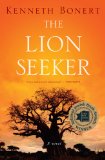Summary | Excerpt | Reviews | Beyond the book | Read-Alikes | Genres & Themes | Author Bio

The Story of an African Childhood
by Robyn ScottHow refreshing to read a memoir of a magical
childhood where parents are loved and respected.
Robyn Scott proves you do not have to come from a
dysfunctional family to tell a great story. And this
book is all about stories. Twenty-eight chapters of
stories of three generations and the lives they have
chosen to live in one of Africa's most beautiful
countries.
There is the story of Botswana with diamond mines, a
new democracy and the devastation of AIDS.
There is Grandpa Ivor's story. An irascible yet
charming World War II veteran of the South African
Air Force who lives in a run-down home with the
remains of a broken Cessna in the yard. He was the
personal pilot of the first President of Botswana
(Sir Seretse Khama) and, during Robyn's childhood,
flies her father to remote bush clinics.
In the wealthier near-by community of Selebi-Phikwe,
live Granny Joan and Grandpa Terry (maternal
grandparents). They live a privileged life in the
heart of the greenest and quietest suburb in a large
house which "smelled of flowers and floor polish and
there was not a trace of dirt anywhere" - a far cry
from Robyn's new new home on Grandpa Ivor's land - a
corrugated cow shed with a dirt floor covered with
mounds of dry cow dung and "tiny-crocodile
creatures" scurrying behind piles of wood stacked
against the walls.
There is the father's story, Keith Scott, a
dedicated physician who often sees as many as
one-hundred patients a day with limited resources
and deplorable conditions.
There is the mother's story, Linda Scott, a
scientist who believes in holistic medicine and
homeschooling (against her parents' wishes), and
educates her children primarily through the simple
medium of stories read aloud and observation of the
natural world. "She read to us most days and
occasionally all day - from breakfast to dinner,
stopping only for cups of tea." Linda is the eternal
optimist. Her comments on seeing the cowshed kitchen
for the first time: "That will take a bit of work,
but it's east-facing so it'll be lovely in the
morning sun."
And of course, mainly, there is Robyn's story -
seeing her family and their adventures in Africa
through her eyes is indeed a reading pleasure.
Describing her parents' return from a long day at
the clinic, she writes:
"The doors swung open and clinic smell—disinfectant, latex-rubber glove powder, sweaty bodies in 104 degree heat—poured out into the night. I breathed deeply of the sweet-sharp mix, letting it wash over me as I kissed Mum and Dad. I loved that smell. The smell of relief at a safe return and anticipation of breath-taking stories Dad might have brought back with him this time."
Most of us read for many reasons. Escape,
adventure, understanding of other cultures, but
always for a good story. Twenty Chickens for a
Saddle, the story of a remarkable family, will
give you all of the above and then some. I highly
recommend it.
About the Author: Born in 1981, Robyn Scott
was homeschooled in her early years by a mother who
believed "children often learn best in unstructured
situations, when they don't know they're learning.
Especially if they're having fun." The Oxford
educated mother also thought a syllabus stifled
creativity and that she was just as capable of
getting her children to university as anyone else.
Evidently her theory proved right as Robyn's formal
education did not begin until age fourteen after
which she went on to earn a Gates Scholarship to
Cambridge University. She received a M.Phil. in
bioscience enterprise, focusing on the pricing of
medicines in developing countries. She lives in
London but works and travels frequently in Africa.
When it was suggested that she write a book of
her childhood in Africa, she asked herself the same
question her grandfather asked after publication.
"Why would anyone care what we all got up to in a
little town in Botswana?"
Fearing that no one could possibly be interested in
the magical events she recalled as a child, she
discarded her original beginning (her earliest
memory of Botswana-- two fruit moths sipping
grape-juice from her grandfather's lips) and instead
wrote of black mamba snakes, the breaking of a
crocodile's jaw and other mortal danger episodes,
but found that she soon ran out of exciting
adventures. It was then that her agent suggested she
return to the magic of the moths and so began the
delightful process of discovering how the quieter
character-rich moments hovered discreetly in the
shadows of grander memories.
Robyn is currently working on a book about the
Group of Hope, a group of inmates in the
maximum security prison of Brandvlei in Botswana,
who have 'adopted' HIV/AIDS orphans and people in
need from the community, providing them with
vegetables and clothes that they have made
themselves in the workshop and toys that were
received as donations.
![]() This review was originally published in The BookBrowse Review in April 2008, and has been updated for the
April 2009 edition.
Click here to go to this issue.
This review was originally published in The BookBrowse Review in April 2008, and has been updated for the
April 2009 edition.
Click here to go to this issue.

If you liked Twenty Chickens for a Saddle, try these:

by Paula McLain
Published 2016
The extraordinary adventures of a woman before her time, the exhilaration of freedom and its cost, and the tenacity of the human spirit.

by Kenneth Bonert
Published 2014
A thrilling ride through the life of one fumbling young hero, The Lion Seeker is a glorious reinvention of the classic family and coming-of-age sagas.
Your guide toexceptional books
BookBrowse seeks out and recommends the best in contemporary fiction and nonfiction—books that not only engage and entertain but also deepen our understanding of ourselves and the world around us.